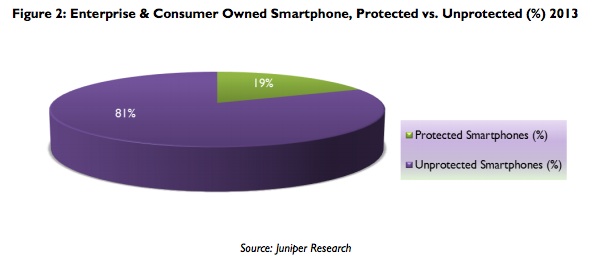 A new report from Juniper Research predicts that by 2018, 35 percent of consumer owned tablets and smartphones will be used for business. The bring-your-own-device trend, which is particularly prevalent in healthcare, will lead to more than a billion employee-owned devices in the workplace.
A new report from Juniper Research predicts that by 2018, 35 percent of consumer owned tablets and smartphones will be used for business. The bring-your-own-device trend, which is particularly prevalent in healthcare, will lead to more than a billion employee-owned devices in the workplace.
According to the report, although BYOD is convenient for employees and can improve employee satisfaction and productivity, it also presents security risks, especially in industries where information is particularly sensitive. Juniper looked at the state of mobile device security as well.
The firm found that Western Europe currently represents the biggest source of revenue for mobile security vendors. Juniper predicted that by the end of 2018, 40 percent of global mobile security sales revenue would be from software.
"This will be driven primarily by increased consumer awareness of available security solutions and – critically – of the risks posed by fraud and malware to data stored on and accessible via their smartphones and tablets," Juniper wrote in a statement.
Although Juniper predicts a high penetration of mobile device security by 2018, the research group also found that at the moment, many devices are unprotected. For the rest of 2013, more than 80 percent of enterprise and consumer owned smartphones won't have security software. Juniper said this is partly because of low consumer awareness about threats of hacking and partly because of "a widespread consumer perception that the price of security products is excessive."

By the end of 2018, however, Juniper predicts that more than half of all mobile devices in the US -- nearly 1.3 billion smartphones, feature phones and tablets -- will have security apps installed by the end of 2018. That's up from just 325 million devices this year.
One can expect that, given concerns about HIPAA, healthcare users are more likely to have security on their devices than the average BYOD user. A KLAS survey in 2012 found that 86 percent of physicians and hospital IT specialists said their hospital had some kind BYOD policy, and 31 percent had full BYOD. Survey respondents used different means to secure their devices: The report showed 52 percent of providers using virtualization, 46 percent using encryption, and 35 percent using mobile device management (there was some overlap between methods).
A survey by Aruba Networks, also conducted in 2012, came up with similar results, showing that 85 percent of hospitals had some kind of BYOD support. However 53 percent only supported consumer devices by allowing them to access the Internet. Far fewer, just 24 percent, said they provided limited access to hospital applications and just 8 percent said they enabled full access to their hospital network for user-owned devices.

















